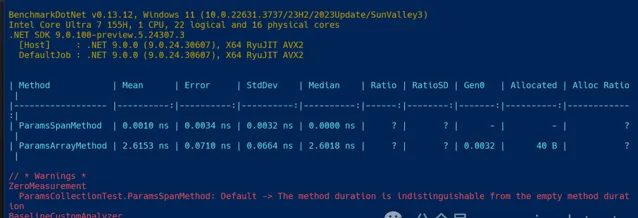C# 13 新特性 params collection
Intro
C# 12 中支持了 collection expression, 统一和简化了常见集合的赋值语法,我们可以使用
[1, 2, 3]
这样的语法来初始化集合,C# 13 扩展了
params
的用法,在之前的版本中我们只能使用
params int[]
,但是从 C# 13 开始,我们也可以使用
params List<int>
/
params IEnumerable<int>
/
params ReadOnlySpan<int>
等集合了
Sample
来看一下使用示例:
ParamsArrayMethod(1, 2, 3);
ParamsListMethod(1, 2, 3);
ParamsEnumerableMethod(1, 2, 3);
ParamsSpanMethod(1, 2, 3);
ParamsReadOnlySpanMethod(1, 2, 3);
voidParamsReadOnlySpanMethod(params ReadOnlySpan<int> collection)
{
foreach (var item in collection)
{
Console.WriteLine(item);
}
}
voidParamsSpanMethod(params Span<int> collection)
{
foreach (var item in collection)
{
Console.WriteLine(item);
}
}
voidParamsListMethod(params List<int> list)
{
foreach (var item in list)
{
Console.WriteLine(item);
}
}
voidParamsEnumerableMethod(params IEnumerable<int> array)
{
foreach (var item in array)
{
Console.WriteLine(item);
}
}
voidParamsArrayMethod(paramsint[] array)
{
foreach (var item in array)
{
Console.WriteLine(item);
}
}
这些在 C# 13 中都是完全合法的使用
在 C# 12 collection expression 的介绍中我们提到过,我们可以实现自定义的集合也支持 collection expression
我们来试试,params 是不是支持我们自定义的集合呢,自定义的集合定义如下
[CollectionBuilder(typeof(CustomCollectionBuilder), nameof(CustomCollectionBuilder.CreateNumber))]
file sealed classCustomNumberCollection : IEnumerable<int>
{
public required int[] Numbers { get; init; }
public IEnumerator<int> GetEnumerator()
{
return (IEnumerator<int>)Numbers.GetEnumerator();
}
IEnumerator IEnumerable.GetEnumerator()
{
return Numbers.GetEnumerator();
}
}
file static classCustomCollectionBuilder
{
publicstatic CustomNumberCollection CreateNumber(ReadOnlySpan<int> elements)
{
returnnew CustomNumberCollection()
{
Numbers = elements.ToArray()
};
}
}
params 使用示例如下:
voidParamsCustomCollectionMethod(params CustomCollection<int> collection)
{
foreach (var item in collection)
{
Console.WriteLine(item);
}
}
ParamsCustomCollectionMethod(1, 2, 3);
dotnet run

可以看到
params
对于我们自定义的集合也是可以支持的
简单使用之后,想一下如果我们相同的重载怎么办呢,我们也来测试一下
publicstaticvoidOverloadTest(paramsint[] array)
{
Console.WriteLine("Executing in Array method");
}
publicstaticvoidOverloadTest(params ReadOnlySpan<int> span)
{
Console.WriteLine("Executing in Span method");
}
首先我们来对比一下 ReadOnlySpan 和数组
ParamsCollectionTest.OverloadTest(1, 2, 3);
ParamsCollectionTest.OverloadTest([1, 2, 3]);
ParamsCollectionTest.OverloadTest(new[] { 1, 2, 3 });
可以先猜测一下输出结果会是什么呢?

从输出结果可以看到,前面两个匹配到的是 Span 方法,后面一个匹配到了数组方法,这里就是优先匹配了 Span 方法
将前面的
ReadOnlySpan
或者
Span
输出结果也还是一样的
那我们指定一下优先级试一下呢? .NET 9 里会引入一个
OverloadResolutionPriorityAttribute
可以用来指定方法解析的优先级,默认优先级是 0,优先级数字越大优先级越高,我们来给 Array 设置一个较高的优先级试一下
[OverloadResolutionPriority(1)]
publicstaticvoidOverloadTest2(paramsint[] array)
{
Console.WriteLine("Executing in Array method");
}
publicstaticvoidOverloadTest2(params ReadOnlySpan<int> span)
{
Console.WriteLine("Executing in Span method");
}
实际输出结果和之前还是一样的,这个 attribute 目前还不工作(现在使用的是 .NET 9 Preview 5),编译器目前还未支持:https://github.com/dotnet/roslyn/issues/74067
我们再看下
params
在有
array
,
IEnumerable
以及
List
的时候重载会怎么样
publicstaticvoidOverloadTest3(params IEnumerable<int> values)
{
Console.WriteLine("Executing in IEnumerable method");
}
publicstaticvoidOverloadTest3(paramsint[] array)
{
Console.WriteLine("Executing in Array method");
}
publicstaticvoidOverloadTest3(params List<int> values)
{
Console.WriteLine("Executing in List method");
}
测试代码:
ParamsCollectionTest.OverloadTest3(1, 2, 3);
ParamsCollectionTest.OverloadTest3([1, 2, 3]);
ParamsCollectionTest.OverloadTest3(Enumerable.Range(1, 3));
这里的 case 有点像 collection expression 的使用,没有具体的 type 的时候,编辑器会确定地无法推断出你想要的是哪一个方法,这里的错误就提示不能够确定使用 array 方法还是使用 list 方法,越具体的类型匹配时优先级越高,
IEnumerable
的优先级相对更低一些
当我们移除 list 或者 array 方法时,编译错误就会消失了,会默认使用具体类型的方法,有具体实现类型的会优先匹配
我们新增一个
ICollection
的重载时也不会报错
publicstaticvoidOverloadTest3(params ICollection<int> values)
{
Console.WriteLine("Executing in ICollection method");
}
最后来猜一下下面这样的重载输出结果会是什么呢?
publicstaticvoidOverloadTest4(params IEnumerable<int> values)
{
Console.WriteLine("Executing in IEnumerable method");
}
publicstaticvoidOverloadTest4(params ICollection<int> values)
{
Console.WriteLine("Executing in ICollection method");
}
publicstaticvoidOverloadTest4(params IList<int> values)
{
Console.WriteLine("Executing in IList method");
}
ParamsCollectionTest.OverloadTest4(1, 2, 3);
ParamsCollectionTest.OverloadTest4([1, 2, 3]);
ParamsCollectionTest.OverloadTest4(Enumerable.Range(1, 3));
Span 的优先级比较高总体上来说会有一些优化,比如不需要创建数组从而避免内存分配,减少 GC 的压力,那具体会有多少差异呢,我们可以跑个简单的 benchmark 试一下
[SimpleJob]
[MemoryDiagnoser]
public classParamsCollectionTest
{
[Benchmark(Baseline = true)]
publicintParamsSpanMethod()
{
return ParamsOverloadMethod(1, 2, 3);
}
[Benchmark]
publicintParamsArrayMethod()
{
return ParamsOverloadMethod(new[] { 1, 2, 3 });
}
privateintParamsOverloadMethod(params ReadOnlySpan<int> span)
{
return span.Length;
}
privateintParamsOverloadMethod(paramsint[] array)
{
return array.Length;
}
}
benchmark result:

因为测试方法的逻辑非常简单,太快了,接近于 0 所以结果里有一些
?
出现, 但是从其他的指标结果我们可以看到我们 Span 的性能更优, 且没有内存分配
.NET 9 里很多方法也是基于这一特性新增了很多 params span 的 方法重载, 可以参考 pr: https://github.com/dotnet/runtime/pull/100898
References
https://github.com/dotnet/csharplang/issues/7700
https://github.com/dotnet/csharplang/blob/main/proposals/params-collections.md
https://github.com/dotnet/csharplang/blob/main/proposals/params-span.md
https://learn.microsoft.com/en-us/dotnet/csharp/language-reference/proposals/params-collections
https://github.com/dotnet/roslyn/issues/74067
https://github.com/WeihanLi/SamplesInPractice/blob/main/net9sample/Net9Samples/CSharp13Samples.cs#L12
https://github.com/dotnet/runtime/pull/100898
https://github.com/dotnet/runtime/pull/102831











